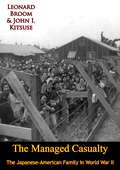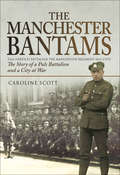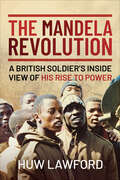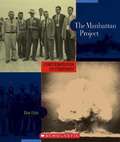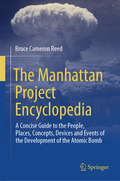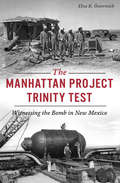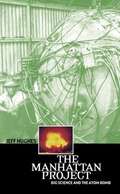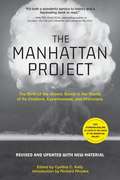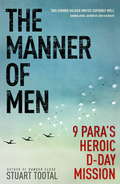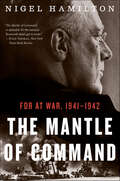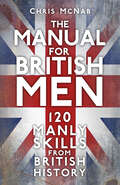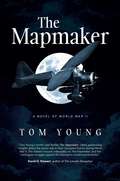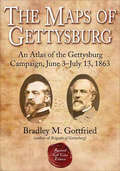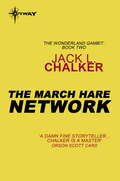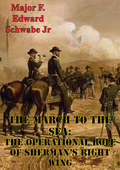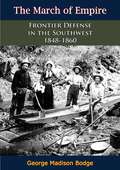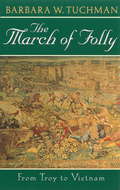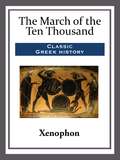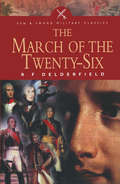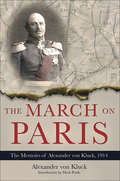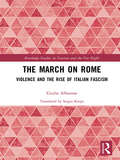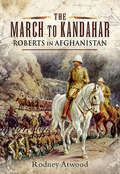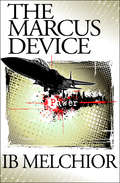- Table View
- List View
The Managed Casualty: The Japanese-American Family in World War II
by Leonard Broom John I. KitsuseTHIS STUDY is an assessment of one major aspect of the adjustment of Japanese Americans to the series of events comprising their removal from the communities of the Pacific Coast early in World War II, their sequestration in temporary centers under governmental control, and their eventual release. It is in a sense an "impact" study in that attention is directed toward the effects administrative policies had on family groups and the resources these groups commanded to adapt to and ameliorate the conditions imposed upon them.The preoccupation of the present study is easily justified. The importance of the family, in Japan as well as in the organization of the Japanese communities in the United States, makes this aspect of the social organization of the minority group a major concern for a rounded understanding of the evacuation. The relevance of the family as the unit of study is also indicated by the administrative policy which explicitly directed that family units be maintained in the processing of the population through the evacuation and relocation programs.
The Manchester Bantams: The Story of a Pals Battalion and a City at War - 23rd (Service) Battalion the Manchester Regiment (8th City)
by Caroline ScottIn May 1916 Major Eustace Lockhart Maxwell, a former Indian cavalry officer, was given command of an infantry battalion in France. After 48 hours with his new unit, Maxwell wrote to his family: The outstanding characteristic of those who belong to it seems to be their extraordinary self-complacency! Esprit de corps is a fine thing, but the satisfaction with which they regard themselves, their battalion, its internal economy, its gallantry, its discipline, its everything else, is almost indecent! If at the end of a month my opinion of them is half as good as their own, I shall think myself uncommonly lucky. This was the 23rd Manchester Bantam Battalion, a unit entirely composed of men of a height between 5ft and 5ft 3, and its esprit de corps was about to be severely tested. The Bantams left colorful, characterful, moving and often amusing records of their experiences. Using a wealth of previously unpublished sources, this book follows the Manchester men through their training, their experiences of the Somme and the Third Ypres Campaign, to Houthulst Forest where, in October 1917, the Battalion was practically annihilated.
The Mandela Revolution: A British Soldier's Inside View of His Rise to Power
by Huw LawfordOn 27 April 1994 South Africa went to the polls and delivered the first black government in the country’s history. This was the Mandela Revolution. This is not the story of how the Rainbow Nation was formed, but it tells a story of one part of the revolution; a vital part, that had to occur to give legitimacy to the new South Africa both at home and abroad. It highlights the political necessity that drove a process and the seemingly inevitable failure that it became. Not a failure of the process itself, but a failure that had to occur to permit acceptability; it resulted in the end of South Africa as a hegemony. This account focuses on how the military forces supporting the Apartheid regime and those committed to its overthrow came together to form a new national force, reflecting the new multi-racial, multi-faith democracy. The process appeared unacceptable in some measure to all sides, but the political instruction in 1994 was that there was to be the integration of the South African defense Force and the armed wings of the African National Congress and the Pan Africanist Congress to form the South African National defense Force. Within this revolution, there was a small detachment from the British armed forces that were charged with assisting this transition. They were required to oversee and assist a process that had never been done before and often had to operate alone. It is a story of highs and lows, of sudden death, breakdowns and ultimately of hope. This is a personal account of three years spent in the middle of this staggering transitional experiment. It was Security Sector Reform and Disarmament, Demobilisation and Reintegration (DDR) before such processes were coined by the United Nations and arguably it was considerably more successful than any such venture attempted by the United Nations. It is a book that demonstrates how success and failure can occur simultaneously.
The Manhattan Project (Cornerstones of Freedom, 2nd Series)
by Dan ElishRecounts the history of the crash program that resulted in the development of the atomic bomb.
The Manhattan Project Encyclopedia: A Concise Guide to the People, Places, Concepts, Devices and Events of the Development of the Atomic Bomb
by Bruce Cameron ReedThis book provides a guide to the people, places, artifacts, events, terminology, scientific concepts, groups, critical documents, and code phrases associated with the Manhattan Project. It is of interest to all readers/researchers (students, journalists, policy-makers, specialist and non-specialist instructors and scientists) who need to rapidly access authoritative, self-contained definitions/descriptions of such items and references to authoritative sources. The individual entries are extensively cross-referenced.
The Manhattan Project Trinity Test: Witnessing the Bomb in New Mexico (Military)
by Elva K. ÖsterreichAt 5:29 a.m. on July 16, 1945, the Trinity Test explosion of the first atomic bomb changed the world forever. The dropping of the bombs on Hiroshima and Nagasaki in Japan followed soon after, but it was the first blast in what is now known as White Sands Missile Range that marked the beginning of the end of World War II. In southern New Mexico, although the Manhattan Project was still top secret, everyday people witnessed the test, experienced its light and power, felt the earth move and knew the world had changed. Author Elva K. Österreich shares the stories of their experience and how their lives were transformed.
The Manhattan Project: Big Science and the Atom Bomb (Revolutions In Science)
by Jeff HughesLaunched in 1942, the Manhattan Project was a well-funded, secret effort by the United States, the United Kingdom, and Canada to develop an atomic bomb before the Nazis. The results―the bombs named "Little Boy" and "Fat Man"―were dropped on Hiroshima and Nagasaki in August of 1945. A vast state within a state, the Manhattan Project employed 130,000 people and cost the United States and its allies 2 billion dollars, but its contribution to science as a prestigious investment was invaluable. After the bombs were dropped, states began allocating unprecedented funds for scientific research, leading to the establishment of many of twentieth century's major research institutions. Yet the union of science, industry, and the military did not start with the development of the atomic bomb; World War II only deepened the relationship. This absorbing history revisits the interactions among science, the national interest, and public and private funding that was initiated in World War I and flourished in WWII. It then follows the Manhattan Project from inception to dissolution, describing the primary influences that helped execute the world's first successful plan for nuclear research and tracing the lineages of modern national nuclear agencies back to their source.
The Manhattan Project: The Birth of the Atomic Bomb in the Words of Its Creators, Eyewitnesses, and Historians
by Richard Rhodes Cynthia C. KellyOn the seventy-fifth anniversary of the first atomic bomb, discover new reflections on the Manhattan Project from President Barack Obama, hibakusha (survivors), and the modern-day mayors of Hiroshima and Nagasaki.The creation of the atomic bomb during World War II, codenamed the Manhattan Project, was one of the most significant and clandestine scientific undertakings of the 20th century. It forever changed the nature of war and cast a shadow over civilization. Born out of a small research program that began in 1939, the Manhattan Project would eventually employ nearly 600,000 people and cost about $2 billon ($28.5 billion in 2020) -- all while operating under a shroud of complete secrecy. On the 75th anniversary of this profoundly crucial moment in history, this newest edition of The Manhattan Project is updated with writings and reflections from the past decade and a half. This groundbreaking collection of essays, articles, documents, and excerpts from histories, biographies, plays, novels, letters, and oral histories remains the most comprehensive collection of primary source material of the atomic bomb.
The Manner of Men: 9 PARA's Heroic D-Day Mission
by Stuart TootalIn June 1944, an elite unit of British paratroopers was sent on a daring and highly risky behind-the-lines mission, which was deemed vital to the success of D-Day. Dropping ahead of the main Allied invasion, 9 PARA were tasked with destroying an impregnable German gun battery. If they failed, thousands of British troops landing on the beaches were expected to die. But their mission was flawed and started to go wrong from the moment they jumped from their aircraft above Normandy. Only twenty per cent of the unit made it to the objective and half of them were killed or wounded during the attack. Undermanned and lacking equipment and ammunition, the survivors then held a critical part of the invasion beachhead. For six bloody days, they defended the Breville Ridge against vastly superior German forces and bore the brunt of Rommel's attempt to turn the left flank of the Allied invasion.The Manner of Men is an epic account of courage beyond the limits of human endurance, where paratroopers prevailed despite intelligence failures and higher command blunders, in what has been described as one of the most remarkable feat of arms of the British Army and the Parachute Regiment during the Second World War.
The Mantle of Command: FDR at War, 1941–1942 (Fdr At War Ser.)
by Nigel HamiltonThis intimate biography reveals how FDR took personal charge of the military during WWII: “Splendid . . . the memoir Roosevelt didn’t get to write” (New York Times Book Review).Based on years of archival research and interviews with the last surviving aides and Roosevelt family members, Nigel Hamilton offers a definitive account of FDR’s masterful—and underappreciated—command of the Allied war effort. Hamilton takes readers inside FDR’s White House and into the meetings where he battled with Churchill about strategy and tactics and overrode the near mutinies of his own generals and secretary of war. Time and again, FDR was proven right and his allies and generals were wrong. When the generals wanted to attack the Nazi-fortified coast of France, FDR knew the Allied forces weren’t ready. When Churchill insisted his Far East colonies were loyal and would resist the Japanese, Roosevelt knew it was a fantasy. As Hamilton’s account reaches its climax with the Torch landings in North Africa in late 1942, the tide of war turns in the Allies’ favor and FDR’s genius for psychology and military affairs is clear. The Mantle of Command “will undoubtedly change the way we see Franklin Roosevelt” (Christian Science Monitor).“Masterly.” —Wall Street Journal
The Manual for British Men: 120 Manly Skills from British History
by Chris McNabAirmen and soldiers, knights and pages, gentlemen and rogues: to you we say stiffen your lip and tighten your sword belt! Tie down your trebuchets, wax your moustache and delve into this manliest of manuals, containing everything the well-bred British man needs to know.The Manual for British Men teaches day-to-day skills such as how to besiege a castle, fire a longbow, correctly clean a Maxim machine gun and capture an enemy trench; sporting sciences such as jousting, fencing and boxing (Queensbury Rules, of course); and domestic essentials such as how to hunt, kill, clean and cook a wild boar.
The Mapmaker: A Novel of World War II
by Tom YoungResistance fighters Charlotte and Philippe, an American woman and a Frenchman, brave death or worse to evade the Gestapo and get critical information to the Allies.Resistance operative Charlotte Denneau has critical targeting information for the Allies, and the Gestapo knows it. On the run across occupied France, she must prioritize her mission over the lives of the agents and civilians she needs to aid her escape. Germans are taking down Resistance networks with disastrous results. Agents are being arrested, tortured, questioned, and turned. Charlotte communicates in coded radio calls to London, well aware the enemy is always listening. More than anything, she must find a flight out—before the Nazis drag her to an interrogation chamber. Philippe Gerard, a French pilot who joined the British Royal Air Force after the fall of France, faces an impossible mission: He must find Charlotte, land by moonlight to pick her up in a farmer&’s field, and evade Luftwaffe fighters on the way back to England. But where is she? If he gets an all-clear signal over a dark pasture, is she really there? Or could the signal be luring him into a trap? In the critical weeks before D-Day, every contribution counts: A well-drawn map, a timely aerial photo, or a daring landing in a muddy field might make the difference between triumph and defeat. Inspired by real-life events from World War II, The Mapmaker demonstrates how individual courage and sacrifice set the stage for victory.
The Maps of Gettysburg: An Atlas of the Gettysburg Campaign, June 3–July 13, 1863 (Savas Beatie Military Atlas Ser.)
by Bradley M. GottfriedA comprehensive collection of Civil War maps and battle plans that brought Union and Confederate forces to the largest battle ever fought on American soil. Thousands of books and articles have been written about Gettysburg—but the military operation itself remains one of the most complex and difficult to understand. Here, Bradley M. Gottfried gives readers a unique and thorough study of the campaign that decided the fate of a nation. Enriched with 144 detailed, full-page color maps comprising the entire campaign, The Maps of Gettysburg shows the action as it happened—down to the regimental and battery level, including the marches to and from the battlefield, and virtually every significant event in-between. Paired with each map is a fully detailed text describing the units, personalities, movements, and combat it depicts—including quotes from eyewitnesses—all of which bring the Gettysburg story to life. Perfect for the armchair historian or first-hand visitor to the hallowed ground, &“no academic library can afford not to include The Maps of Gettysburg as part of their American Civil War Reference collections&” (Midwest Book Review).
The Marcelli Bride: The Marcelli Bride And The Marcelli Princess
by Susan MalleryUSA Today bestselling author Susan Mallery returns to the idyllic setting of her sensual Marcelli sisters trilogy—California wine country, where love and laughter flow, and where an unlikely couple discovers the one thing their hearts hunger for most: a place to call home. The rebel of the Marcelli family, Joe never joined his sisters Katie, Francesca, and Brenna in running the winery business. Instead, he chose a life of military service. But now that this handsome, headstrong former Navy SEAL has received a new, undercover assignment—protecting none other than the commander in chief's daughter—he finds himself stationed back at the California vineyard he defiantly left behind. First-daughter Darcy Jensen has been placed in hiding at the Marcelli Winery after surviving a kidnapping attempt, and now it's Joe's job to keep the fearful, fiery beauty out of harm's way. Begrudgingly, Joe heeds his presidential order—until "babysitting" Darcy proves to be the greatest pleasure he's ever known. How can Joe protect Darcy from danger, when he's falling dangerously in love? And can Darcy trust that Joe's intentions are true when no one else's have ever been?
The March Hare Network (Wonderland Gambit)
by Jack L. ChalkerTime after time, life after life, Cory Maddox was being incarnated into worlds he found both familiar and strangely different. And only in this latest incarnation did Cory bring along knowledge, skills, and memories of his previous existence - memories of cold betrayal that promised nothing he saw or felt could be trusted. Nor could he trust his companions who, like himself, kept moving from life to life trying to escape the endless cycle. But it was only with the help of those companions that Cory could develop the technological means to peer beyond the veil of reality - to the shadowy figures whom he was sure were manipulating reality . . . if what he was experiencing actually was reality.Time was running out. His memories gave him an advantage over the others, but he would have to act quickly and surely if he were to discover the truth - before truth itself could no longer be trusted . . .
The March To The Sea: The Operational Role Of Sherman’s Right Wing
by Major F. Edward Schwabe Jr. U.S. ArmyExamines the operations of Sherman's 15th and 17th Corps during the march through Georgia in the Fall of 1864, with emphasis on their respective roles in support of Sherman's strategy. The study focuses on the role of the march within the context of overall Union strategy, the special preparations for the movement to the coast, and the actions of the 15th and 17th Corps during the latter two-thirds of the march (23 November-10 December, 1864). The operations of the 15th Corps are particularly emphasized to highlight its role in forcing the rapid collapse of Confederate opposition in front of Sherman's advance.The study concludes that though largely ignored and overshadowed by the actions of the left wing and Union cavalry, the accomplishments of the right wing (particularly the 15th Corps) were a more important validation of Sherman's strategic gamble. After feinting toward Macon, the 15th and 17th Corps "disappeared" into a sparsely settled wilderness--marching unopposed for over one hundred miles through some of the poorest regions of Georgia. But its movements during this period served to fragment and paralyze Confederate efforts to delay Sherman's advance, and played a significant role in enabling the Union Army to rapidly gain the coast and to open communications with the U.S. Navy.At the same time, the study defines the logistical needs of Sherman's army as its greatest vulnerability--one which the Confederates were unable to exploit.
The March Up: Taking Baghdad with the 1st Marine Division
by Bing West Ray L. SmithTaking us straight to the front lines, The March Up follows the famed 1st Marine Division on their decisive 1,184 kilometre trek to Baghdad, from first assault to the taking of the city. The 1st Marine Division, which had fought in Guadalcanal, Khe San, and Kuwait City, provided the critical force in Operation Iraqi Freedom. With unprecedented access to everyone from three-star generals to privates, authors West and Smith, men with 60 years of military and combat experience between them, trace the strategic war plans as they unfolded in battle, providing unflinching portrayals of what went well and what went poorly, and detailing power struggles and failures which have never before been reported. No embedded journalist had the mobility, battlefield knowledge or personal contacts as West and Smith. They were able to observe eighteen separate combat units in the division. What emerges is a dramatic, personal and human account of how the corporals fought and the generals plotted, revealing the men behind the guns and the brave and sometimes unorthodox actions that resulted in astonishing triumphs. THE MARCH UP is the behind-the-scenes story of how the men on the frontlines and the strategists in the backroom turned the march to Baghdad into a road to victory.
The March of Empire: Frontier Defense in the Southwest 1848-1860
by Averam Burton BenderComprised of the frontier military and the Indian conflicts of the southwest preceding the Civil War. The conflicts and eventual peace. Well researched and written.“Between 1845 and 1848 the United States came into possession of a princely domain. During that short period of time it acquired Texas, the Oregon country, and the Mexican Cession—more than a million square miles of territory—and thereby virtually established its present western and southern boundaries. Then came the discovery of gold in California and the mighty emigrant waves to the El Dorado. The problem of frontier defense, ever present from the beginning of the nation’s history, was truly formidable now. The frontier was much longer and more remote, and the pioneers, though more numerous, were often dangerously scattered. The Indian was too close to the white man. The national government had acquired an added responsibility—defense of the new frontier.The period 1848-60 witnessed the evolution of the trans-Mississippi policy of defense. United States armies and engineers, supplementing the activities of the unofficial explorers, traders and trappers, blazed the trail for the march of empire...Moreover, the frontier army created an era full of color and romance which left a deep impression on our literature, our drama, and our arts. Some of our most distinguished military leaders of the Civil War—McClellan, Sherman, Grant, and Lee—served their apprenticeship on the western frontier. It is the purpose of this study to examine important phases of frontier defense in our Far Southwest—Texas, the Territories of New Mexico and Utah, and California—in the twelve years preceding the Civil War. Neighboring areas, such as present-day Kansas, Colorado, and Oklahoma, necessarily formed an integral part of the Southwest of the period.”-Print ed.
The March of Folly: From Troy to Vietnam
by Barbara W. TuchmanTwice a winner of the Pulitzer Prize, author Barbara Tuchman now tackles the pervasive presence of folly in governments through the ages. Defining folly as the pursuit by governments of policies contrary to their own interersts, despite the availability of feasible alternatives, Tuchman details four decisive turning points in history that illustrate the very heights of folly in government: the Trojan War, the breakup of the Holy See provoked by the Renaissance Popes, the loss of the American colonies by Britain's George III, and the United States' persistent folly in Vietnam. THE MARCH OF FOLLY brings the people, places, and events of history magnificently alive for today's reader.From the Trade Paperback edition.
The March of the Ten Thousand
by XenophonStranded deep in enemy territory, the Spartan general Clearchus and the other Greek senior officers were subsequently killed or captured by treachery on the part of the Persian satrap Tissaphernes. Xenophon, one of three remaining leaders elected by the soldiers, played an instrumental role in encouraging the Greek army of 10,000 to march north across foodless deserts and snow-filled mountain passes towards the Black Sea and the comparative security of its Greek shoreline cities.
The March of the Twenty-Six (Pen & Sword Military Classics)
by R. F. DelderfieldBetween the years 1804 and 1815, Napoleon created twenty-six Marshals of France. These men, who held the highest positions in the Empire after Napoleon himself, came from very diverse backgrounds and ranged from a smuggler to a Prince. They acquired titles and great riches but in the end there was only one who was not corrupted by greed or ambition. This book describes their rise and fall.
The March on Paris: The Memoirs of Alexander von Kluck, 1914
by Alexander von KluckVon Kluck saw active military service at an early age during the Seven Weeks' War of 1866 and, in 1870-71, the Franco-Prussian War. Rising through the army, he became inspector general of the Seventh Army District in 1913.During the First World War von Kluck commanded the German First Army, notably in the Schlieffen Plan offensive against Paris at the start of the war in August 1914. An aggressive commander, von Kluck's impatience (at the request of Second Army commander von Bulow - who was unwilling to allow gaps to appear in the German front - he switched his advance south and east of Paris rather than the planned north and west), allied with a lack of direction from the German High Command and effective French and British counter-attacks, led to the failure of the Schlieffen offensive.Von Kluck's role in the plan was to command the extreme right of the German forces in attacking the left flank of the French army and encircling Paris, bringing a rapid conclusion to the war.After capturing Brussels on 20 August, von Kluck was almost successful in defeating France, his forces being halted a mere 13 miles from the French capital in the First Battle of the Marne from 6-9 September 1914. His forces had earlier fought costly battles against the British at Mons and at Le Cateau. With the suspension of the German offensive the nature of the battle changed to one of trench warfare, remaining essentially static until the end of the war.Von Kluck was himself seriously wounded in the leg in March 1915, retiring from active service the following year in October 1916.
The March on Rome: Violence and the Rise of Italian Fascism (Routledge Studies in Fascism and the Far Right)
by Giulia AlbaneseThe aim of this book is to reconstruct the violent nature of the March on Rome and to emphasise its significance in demarcating a real break in the country's history and the beginning of the Fascist dictatorship. This aspect of the March has long been obscured: first by the Fascists' celebratory project, and then by the ironic and reductive interpretation of the event put forward by anti-Fascists. This volume focuses on the role and purpose of Fascist political violence from its origins. In doing so, it highlights the conflictual nature of the March by illustrating the violent impact it had on Italian institutions as well as the importance of a debate on this political turning point in Italy and beyond. The volume also examines how the event crucially contributed to the construction of a dictatorial political regime in Italy in the weeks following Mussolini's appointment as head of the government. Originally published in Italian, this book fills a notable gap in current critical discussion surrounding the March in the English language.
The March to Kandahar: Roberts in Afghanistan
by Rodney AtwoodThe story of the British commander who led a three-hundred-mile march from Kabul to Kandahar and became the toast of Victorian England. This book examines the role of Frederick Roberts in the Second Anglo-Afghan War, culminating in his famous march in 1880 with ten thousand British and Indian soldiers, covering three hundred miles in twenty-three days, from Kabul to Kandahar to defeat the Afghan army of Ayub Khan, pretender to the Amirship of Kabul. The march made Roberts one of late Victorian England&’s great military heroes, partly because of the achievement itself, partly because the victory restored British prestige after defeat, and finally because of Roberts&’ astute use of the press to puff his victory. This overcame the earlier damage done to his reputation by the political storm that followed his hanging of over eighty Afghans in revenge for the massacre of a British envoy and his escort. It enabled the liberal Viceroy of India, Lord Ripon, to extract his forces from an Afghan imbroglio with prestige restored and an emir on the Afghan throne who for thirty-nine years maintained friendship with British India. Roberts (or Bobs as he was known) subsequently advanced to command the Indian Army, working closely with future viceroys to influence Indian defense policy on the North-West Frontier, and being hymned by Rudyard Kipling, poet of empire. His bestselling autobiography, Forty-One Years in India, established his image before the British public and he remains one of Britain&’s best known, if least understood, military figures
The Marcus Device
by Ib MelchiorOur top-secret weapon is missing. And America&’s top test pilot is missing too. Full of a fierce, obsessive will to live, Tom Darby is about to test-fire the USA&’s ultimate weapon—when something goes tragically wrong. His F-15 fighter explodes in a ball of fire. He ejects into the killing heat of Death Valley. Crazed by injuries, he becomes a wild beast running for his life from unseen enemies—and from his rescuers. Even from his beautiful wife. American teams want him. So do sinister East German agents, headed by an ex-Nazi. Because they believe he possesses . . . The Marcus Device
